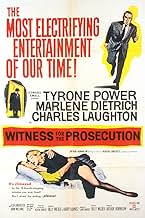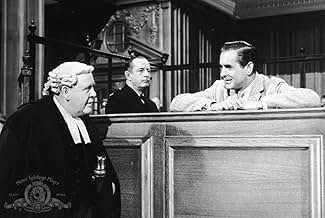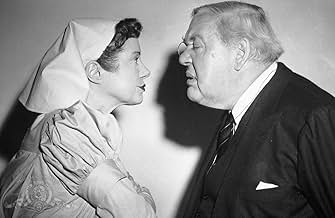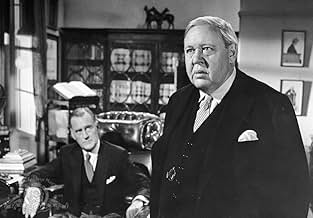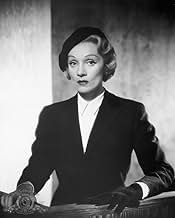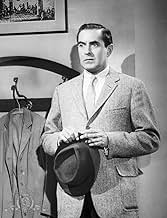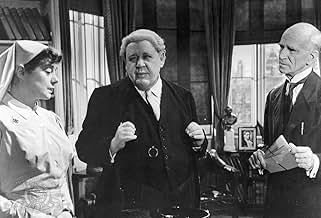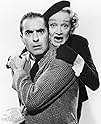Un veterano abogado británico debe defender a su cliente en un juicio por asesinato en el que surge una sorpresa tras otra.Un veterano abogado británico debe defender a su cliente en un juicio por asesinato en el que surge una sorpresa tras otra.Un veterano abogado británico debe defender a su cliente en un juicio por asesinato en el que surge una sorpresa tras otra.
- Dirección
- Guionistas
- Elenco
- Nominado a 6 premios Óscar
- 3 premios ganados y 15 nominaciones en total
Patrick Aherne
- Court Officer
- (sin créditos)
Don Ames
- Bar Patron
- (sin créditos)
Larry Arnold
- Courtroom Spectator
- (sin créditos)
Walter Bacon
- Bar Patron
- (sin créditos)
Eddie Baker
- Courtroom Spectator
- (sin créditos)
Resumen
Reviewers say 'Witness for the Prosecution' is celebrated for its intricate plot, masterful direction by Billy Wilder, and standout performances by Charles Laughton and Marlene Dietrich. The film delves into themes of justice, deception, and complex human relationships within a gripping courtroom drama. Its twisty narrative and surprising ending are often praised for enhancing suspense and entertainment. Despite minor critiques on pacing and some performances, the overall reception is highly positive, marking it as a genre classic.
Opiniones destacadas
At the end of the day the films you give top marks are those films that become constant companions. You can see them again at the drop of a hat, you show them to people who have never see them and it's always a triumph. "Witness For The Prosecution" is one of those wonders. Suspend your disbelief for a couple of hours and enjoy this banquet of a romp. Charles Laughton showed here what he was made of better, more clearly and more loudly than in any other film and all of his films, at least the moments with him in it, are unforgettable - Captain Blight or Henry VIII, Quasimodo or that malefic Senator from South Carolina. Here the severity of his lawyer by vocation takes your senses away with his masterful judicial way to see logic and it's such an incredible fun to watch him do it. Tyrone Power is a toy in his hands but not Marlene Dietrich who stands her ground, not merely as a character but as a presence on the screen. Billy Wilder visits early Hitchcock territory with wit and fun. Elsa Lanchester's nurse is the cherry on top of this delightful film.
To see "Witness for the Prosecution" for the first time in 2008 is a jolting surprise. Nobody could do it better than Billy Wilder did in 1957. A man accused of murder, Tyrone Power, the weakest link in this terrific chain. Sir Wilfred is called to defend him, he is played by the extraordinary Charles Laughton, but he's just out of hospital - he wasn't dismissed he was expelled - and due to doctor's orders he's not to take any criminal cases. He finds Power charming and personable enough but he's not going to risk his life to save his until Marlene Dietrich makes her entrance - and what an entrance! How marvelous that what amounts to a bit of Agatha Christie's usual fare becomes such an entertaining and at times right down riveting piece of film-making.
Another brilliant work in the legendary career of Billy Wilder. The director signs a cinematic adaptation of this Agatha Christie story: actually it is really as if the camera went on stage for filming the play. But the film is passionating and exciting, there's no time to get bored.
Another thing we shall not forget is that Billy Wilder is European. He manages to keep the spirit of the film very British, with lots of humour and sarcasm. Compared to films like this one, "legal" movies from John Grisham's novels are empty and meaningless, without soul.
Mr.Wilder is the director, we know; we have Charles Laughton, Tyrone Power and Marlene Dietrich: what a cast! Add a superb black and white cinematography... The result is amazing, with a film where dialogues are flawless and carry everything.
Times are different now, but the atmosphere and the taste of movies like this one are impossible to find in contemporary films.
Another thing we shall not forget is that Billy Wilder is European. He manages to keep the spirit of the film very British, with lots of humour and sarcasm. Compared to films like this one, "legal" movies from John Grisham's novels are empty and meaningless, without soul.
Mr.Wilder is the director, we know; we have Charles Laughton, Tyrone Power and Marlene Dietrich: what a cast! Add a superb black and white cinematography... The result is amazing, with a film where dialogues are flawless and carry everything.
Times are different now, but the atmosphere and the taste of movies like this one are impossible to find in contemporary films.
This is one of the best "trial movies" ever made. It's an outstanding film that is just as good today as it was almost 50 years ago when it was released in the theaters. The shocking ending caused quite a stir back then, too.
The only part of the movie I thought looked dated and unrealistic was Tyrone Power's character being able to interrupt the trial with outbursts and not be reprimanded for it. There is no way that would be tolerated, at least today.
Otherwise, it's a pretty solid film with a good cast that includes two fascinating characters played by actors who know how to entertain: Charles Laughton and Marlene Dietrich.
Laughton, who plays Power's defense attorney, grabs the spotlight in the story but Dietrich almost steals the movie in her role as Power's wife. Laughton's dialog is terrific throughout, bringing a number of laughs to this serious film. He's just a joy to watch. Dietrich is even more riveting but just doesn't have anywhere near the same amount of screen time as Laughton.
Not to be overlooked is Elsa Lanchester, playing Laughton's nurse. She, too, demonstrates her comedic talent and significantly adds to the fun of watching this film.
If you like some fine drama, storyline twists, a little humor thrown in and great acting and dialog, this is a classic film to check out.
The only part of the movie I thought looked dated and unrealistic was Tyrone Power's character being able to interrupt the trial with outbursts and not be reprimanded for it. There is no way that would be tolerated, at least today.
Otherwise, it's a pretty solid film with a good cast that includes two fascinating characters played by actors who know how to entertain: Charles Laughton and Marlene Dietrich.
Laughton, who plays Power's defense attorney, grabs the spotlight in the story but Dietrich almost steals the movie in her role as Power's wife. Laughton's dialog is terrific throughout, bringing a number of laughs to this serious film. He's just a joy to watch. Dietrich is even more riveting but just doesn't have anywhere near the same amount of screen time as Laughton.
Not to be overlooked is Elsa Lanchester, playing Laughton's nurse. She, too, demonstrates her comedic talent and significantly adds to the fun of watching this film.
If you like some fine drama, storyline twists, a little humor thrown in and great acting and dialog, this is a classic film to check out.
WARNING: SPOILERS AHEAD!
I'm not sure I have the ability to adequately praise this film. The original short story(rather unremarkable, actually)has been expanded into a magnificent example of Hollywood entertainment at its best. In addition to perhaps the finest line-up of character actors ever assembled(next to Cukor's David Copperfield, that is), we get Laughton and Dietrich at the top of their form. The person who criticised Lanchester's performance as "annoying" missed the point entirely. Miss Plimsoll is meant to be annoying! Also, what's with all the bad-mouthing of Tyrone Power? "Hammy"; "terrible"; "worst performance ever". These are the perceptive IMDb reviews? Only one of you got it right: it's hammy because Leonard Vole is the one acting, not Power! For 95% of the film, the character is dissembling, only showing his true colors at the end. Of course it looks hammy: Vole isn't a born actor like his wife. And to all those know-it-alls who called this film mediocre and predictable, I look forward to your upcoming film projects which I'm sure will be paragons of excellence and worthy to be set alongside classics of the golden age.
I'm not sure I have the ability to adequately praise this film. The original short story(rather unremarkable, actually)has been expanded into a magnificent example of Hollywood entertainment at its best. In addition to perhaps the finest line-up of character actors ever assembled(next to Cukor's David Copperfield, that is), we get Laughton and Dietrich at the top of their form. The person who criticised Lanchester's performance as "annoying" missed the point entirely. Miss Plimsoll is meant to be annoying! Also, what's with all the bad-mouthing of Tyrone Power? "Hammy"; "terrible"; "worst performance ever". These are the perceptive IMDb reviews? Only one of you got it right: it's hammy because Leonard Vole is the one acting, not Power! For 95% of the film, the character is dissembling, only showing his true colors at the end. Of course it looks hammy: Vole isn't a born actor like his wife. And to all those know-it-alls who called this film mediocre and predictable, I look forward to your upcoming film projects which I'm sure will be paragons of excellence and worthy to be set alongside classics of the golden age.
¿Sabías que…?
- TriviaCharles Laughton, who could be moody and difficult, was apparently a dream to work with, throwing himself into the role with dedication and delight. Billy Wilder later recalled a day that was set aside just for shooting reaction shots of the jury and courtroom crowd (composed of extras hired only for the day). Normally, the assistant director would read the actors' lines, and the extras would react. However, Laughton, who was fascinated with the whole process of filmmaking, begged to help. So he came in on his day off and read all of the off-camera speeches to the jury members. He not only read his part but also the judge's, the prosecutor's, and even Marlene Dietrich's. According to biographer Maurice Zolotow in his book "Billy Wilder in Hollywood", "it was an exhibition of craftsmanship such as Wilder had never seen. He believes that Charles Laughton had the greatest technical range and power of any actor, man or woman, whom he has known."
- Errores(at around 9 mins) Inside his chamber, Sir Wilfrid lights his cigar, and Leonard Vole locks the door to make sure that Miss Plimsoll can't enter the room and catch him smoking. Later (at around 15 mins), Wilfrid leaves his chamber without first unlocking the door.
Actually, Vole does not lock the door, but puts the keyhole cover in place to stop Plimsoll spying through the keyhole.
- Citas
Sir Wilfrid: I am constantly surprised that women's hats do not provoke more murders.
- Créditos curiososAs the end credits appear on screen, an announcer's voice is heard: "The management of this theater suggests that for the greater entertainment of your friends who have not yet seen the picture you will not divulge to anyone the secret of the ending of Witness for the Prosecution."
- ConexionesFeatured in Marlene (1984)
- Bandas sonorasI May Never Go Home Anymore
Music by Ralph Arthur Roberts
Lyrics by Jack Brooks
Sung by Marlene Dietrich (uncredited)
Reprised a cappella by Tyrone Power (uncredited)
Selecciones populares
Inicia sesión para calificar y agrega a la lista de videos para obtener recomendaciones personalizadas
Everything New on Prime Video in July
Everything New on Prime Video in July
Your guide to all the new movies and shows streaming on Prime Video in the US this month.
- How long is Witness for the Prosecution?Con tecnología de Alexa
- What is 'Witness for the Prosecution' about?
- Is "Witness for the Prosecution" based on a book?
- When and where does the story take place?
Detalles
- Fecha de lanzamiento
- País de origen
- Idiomas
- También se conoce como
- Witness for the Prosecution
- Locaciones de filmación
- Productora
- Ver más créditos de la compañía en IMDbPro
Taquilla
- Presupuesto
- USD 3,000,000 (estimado)
- Total a nivel mundial
- USD 7,903
- Tiempo de ejecución1 hora 56 minutos
- Color
- Relación de aspecto
- 1.66 : 1
Contribuir a esta página
Sugiere una edición o agrega el contenido que falta

Principales brechas de datos
What is the streaming release date of Testigo de cargo (1957) in Brazil?
Responda
![Ver Trailer [OV]](https://m.media-amazon.com/images/M/MV5BNTM2MjYzMjAtZjI5MC00YTI1LWI2MzAtMWFlNDc2OTU1MTRiXkEyXkFqcGdeQXRyYW5zY29kZS13b3JrZmxvdw@@._V1_QL75_UX500_CR0)
